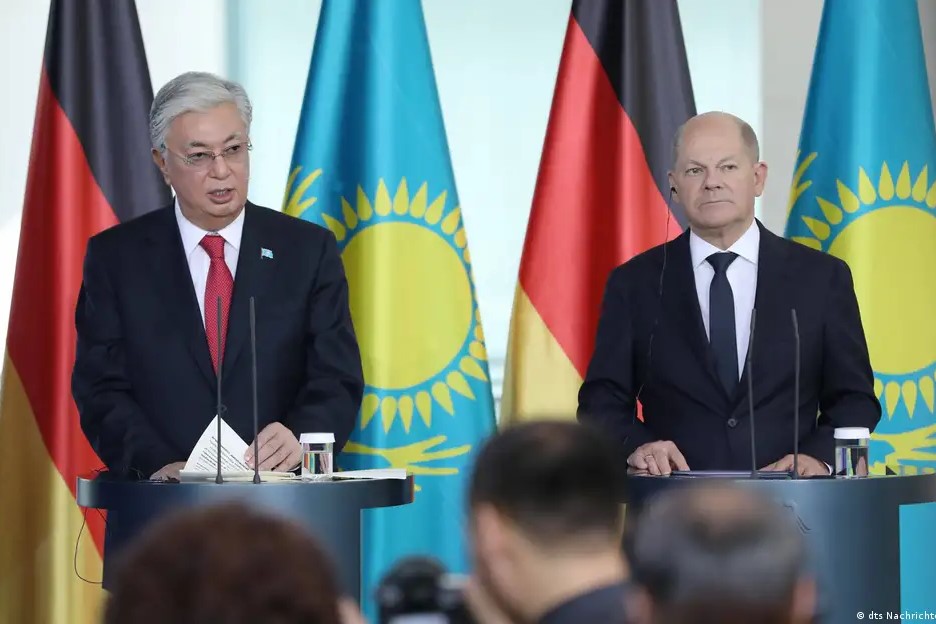
Kazakhstan’s President Tokayev and Germany’s Chancellor Scholtz answer questions from reporters in Berlin. Source: DW
President Tokayev of Kazakhstan met with Germany’s President Frank-Walter Steinmeier and Chancellor Olaf Scholz as part of his visit to Germany this week (Astana Times; Kaz Inform). Germany is one of Kazakhstan's top investors and major trading partners. Nearly 83% of Germany's entire commerce with Central Asia is with Kazakhstan. Bilateral trade surged by 25% to reach $2.8 billion, and German companies have invested approximately $6 billion in Kazakhstan (Astana Times). President Tokayev suggested to Chancellor Scholz the formation of a consortium to ensure the realization of collaborative raw materials projects by 2040. A crucial symbol of improved bilateral ties is the summit of the leaders of Central Asian nations with German Chancellor Olaf Scholz in the C5+1 format, which was held shortly after the C5+1 summit with US President Joe Biden on the sidelines of the UNGA on September 28th. The C5+1 model aims to further develop regional cooperation and integration in Central Asia. This is further evidenced by the frequency of top-level visits of President Tokayev to Germany. This is his third visit to Germany in the past four years.
The current conflict in the Ukraine and Kazakhstan's enhanced collaboration with Western powers received greater media coverage during the past week (Astana Times; Kaz Inform). President Tokayev responded to these concerns by restating that Kazakhstan and Russia have a long history of working together, especially in the commerce and humanitarian sectors, and will continue to work together. Kazakhstan supports an early end to hostilities in the Ukrainian crisis and the start of peace negotiations based on the principles of the UN Charter. Tokayev asserted that the border between Kazakhstan and Russia had been delineated and is recognized by the parliaments of the two nations. Thus, Kazakhstan is not concerned about Russian territorial claims (Kaz Inform). In addition, President Tokayev reaffirmed that Kazakhstan would uphold the sanctions regime and would not assist Russia in circumventing them (Moscow Times).
On September 27, Kazakhstan announced that it has made headway on creating commerce, transportation, and logistics centers along its borders with China, the Kyrgyz Republic, Russia, Uzbekistan, and the Caspian Sea (Astana Times; Kazakhstan Today). This project is a part of President Tokayev's goal for Kazakhstan to become a crucial logistics and transportation hub for Central Asia and the Caspian Sea. According to Kazakhstan's Deputy Prime Minister Serik Zhumangarin, the Sarzha multipurpose sea terminal on the Caspian Sea is projected to be finished by 2030. This terminal, which has a 10 million tons annual capacity, will include a 5.5 million ton crude oil terminal, a 1.5 million ton grain terminal, a 1 million ton general cargo terminal, and a 2 million ton universal terminal. The Alatau industrial trade and logistics complex on the Kyrgyz Republic's border is expected to open in the second quarter of 2026. With the mission of becoming an international business platform inside the Eurasian Economic Union (EAEU), the Eurasia cross-border trade hub will be constructed by the end of 2024 on land near the Uralsk airport.
The European Bank for Reconstruction and Development (EBRD) and the State Savings Bank of the Republic of Tajikistan forged a strategic collaboration aimed at bolstering local currency lending to drive growth in Tajikistan's real sector (Asia-Plus). Both entities formalized their partnership by signing a Memorandum of Understanding (MOU), marking the commencement of collaborative efforts. This collaboration will enable Tajik financial institutions to extend local currency loans to micro, small, and medium enterprises, as well as individual entrepreneurs within Tajikistan. According to a report by the EBRD, the economies of Central Asian countries have demonstrated notable growth in the first half of the year 2023 (Asia-Plus). It further reports that anticipated economic expansion in Tajikistan stands at an impressive 7.5% for both 2023 and 2024. This result is driven due to improved regional collaboration, and substantial public investments in areas such as water and energy. In partnership with the Green Climate Fund (GCF), EBRD is actively advancing elevated standards of energy and resource efficiency, propelling Tajikistan towards a more sustainable economy. This initiative involves a substantial financial commitment, with a generous donation of $50 million earmarked for Tajikistan's green transition (Asia-Plus; Sputnik)
Elsewhere, the 11th session of the Intergovernmental Council between Kyrgyzstan and Kazakhstan took place in the city of Taraz (24.Kg), where parties discussed topics such as water, energy, and cultural exchange. According to Kyrgyzstan’s officials, the trade turnover between the two countries has increased. The two sides reached a mutual agreement to enhance their collaborative efforts in the trade sector, with the aim of elevating it to a target of $2 billion. In this vein, Kazakhstan and Kyrgyzstan have come to an agreement to guarantee a continuous provision of vital commodities, including grain, oil, sugar, and fuel (24.KG).
Finally in Afghanistan, the abrupt cessation of financial aid from the World Food Programme (WFP) was reported to have exacerbated the already dire circumstances for women (Afghanistan Times, Khaama). A representative from WFP emphasized that the situation for women in Afghanistan is already challenging, characterized by social exclusion and limited access to financial aid, food, and access to education, and a sharp drop in WFP's aid will make this situation much worse. Elsewhere it was reported that in response to the Taliban's imposed restrictions, a "Women’s Online University" has emerged, offering women the opportunity to pursue education remotely (Afghanistan Times). The Online University has around 14 faculties and around 14,000 female students. The Vice Chancellor of the University emphasized the university’s unwavering commitment to providing education for girls in Afghanistan, even in the face of the imposed ban.

